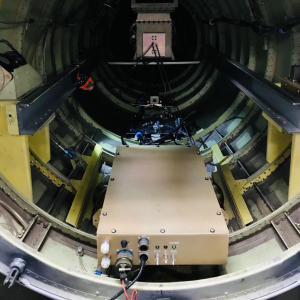Harvard’s DCOTSS Portable Optical Particle Spectrometer (DPOPS) is an in situ instrument capable of measuring particle number density as a function of size throughout the troposphere and lower stratosphere. The core instrument (POPS, Handix Scientific, Boulder, CO), re-packaged by Harvard, uses a 405 nm diode laser to count and size individual particles in the size range 140–3000 nm. 3D printing technology was used in the construction of the instrument to reduce cost, manufacturing complexity, and weight. The DPOPS is an optimized POPS system for DCOTSS flight campaign with autonomous operation in flight that requires minimal support between flights. Three major upgrades are: (1) increasing the sampling flow with external pumps to achieve better counting statistics in light of the low particle number density, (2) achieving isokinetic sampling (the velocity of air entering the inlet is equal to the velocity of the approaching gas stream) with a custom inlet to ensure fidelity of sampling with respect to size, and (3) optimizing the tubing system to reduce the loss of particles in the sampling tubes. DPOPS can fly on pressurized or unpressurized aircraft.
DCOTSS Portable Optical Particle Spectrometer
Instrument Type
Measurements
Aircraft
Point(s) of Contact
(POC; PI),
(Co-I)
Disclaimer: This material is being kept online for historical purposes. Though accurate at the time of publication, it is no longer being updated. The page may contain broken links or outdated information, and parts may not function in current web browsers. Visit https://espo.nasa.gov for information about our current projects.


